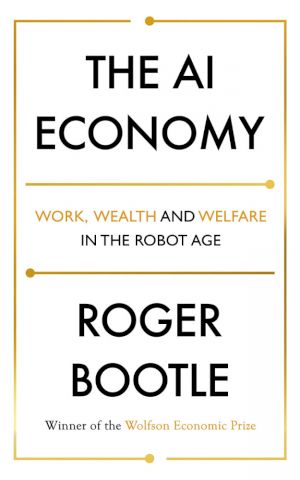02 December 2019
The AI Economy:
Work, Wealth and Welfare in the Robot Age
Roger Bootle
2019, Nicholas Brealey Publishing, 224 pages,
ISBN 9781473696167
Reviewer: Vicky Pryce, CEBR

Opinion on the disruptive impact of Artificial Intelligence (AI),as Roger Bootle demonstrates in this book, is sharply divided: AI will be the end of humans as we know it, leading to what is termed the ‘Singularity’ – with a capital S with robots acquiring ‘general intelligence’ equal to a human being– and from then on develop outside our control. Or not, as humans are unique in the way they think and act and so cannot be replicated with ease anytime soon – and even if this were to eventually happen, that would take so long that the human race would be much more likely, according to Bootle, to be destroyed before that occurs by nuclear wars, climate change or, even, an asteroid before AI takes over completely.
Bootle leans to the view that the AI revolution is just another phase of the industrial revolutions we have been experiencing over the last few hundred years which though severe in their impact and bringing with them radical changes in the type of skills required, distribution of income, and balance between work and leisure, have been embraced and dealt with in a way that has benefited the human race as a whole and allowed greater prosperity, spread widely. Of course, the advance of AI may need a further rethink of policies , such as a universal basic income advocated by some as the way to cope with job losses and outdated skills that may result from AI, but which Bootle does not favour as he worries that, at whatever level it is set, it might in fact reduce incentives to work . But he stresses the almost certain likelihood that AI will also bring benefits in health outcomes and in the experience of old age.
AI, according to his view, presents the type of challenge that the human race has been able to adapt to many times before and managed to shape to suit it. And it has generally benefited from any accompanying changes. Bootle presents a lot of scientific and other evidence arguing both sides. He decides to choose the optimistic one knowing that many disagree. I hope he is right.
And yet in his last chapter he allows himself to think of the unthinkable. What if AI does indeed take over, and robots move to a point beyond which they develop further without human intervention? What will be the economic implications? Probably bleak. And the ethical ones? Very complicated. And where will the world go from there? Even as a born optimist the author is worried about the challenge posed by the task ahead. But he still thinks that it is not inevitable and that the distinction between humans and AI will remain as humans not only think but also feel. It’s hard to imagine that robots can in fact end up possessing consciousness.
So humans will still have the edge? I must admit while reading the book, though I admired Roger Bootle’s quixotic stance against the army of AI enthusiasts, I myself was tending to err on the side of the pessimists. But I am partly reassured by the people he has consulted in preparing this volume including the Oxford don Anthony Courakis , my one-time academic supervisor; George de Nemeskeri-Kiss , my City contemporary back in the days when I started as a young bank economist; or the extremely down to earth, no-nonsense Professor Geoffrey Wood. But of course, I should have remembered how widely read and connected Roger Bootle is. One of the people to have endorsed the book on the cover is one Boris Johnson.
